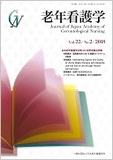Japanese
English
- 販売していません
- Abstract 文献概要
- 参考文献 Reference
抄録
本研究の目的は,独居の要介護後期高齢者が,ADLが低下していくなかでどのようなことを日常生活上の困難ととらえ,その困難に対してどのように対処しようとしているのかを明らかにすることである.対象は,訪問看護を利用中の独居の要介護2〜4の後期高齢者3人とし,参加観察と半構造化面接を行い,質的記述的に分析した.
3人の困難は,自身の身体の変化に起因するものとして,思いどおりに活動ができない困難,思いどおりに体調をコントロールできない困難,生きる意味を見いだせない困難が,他者の介入に起因するものとして,考えが異なっても支援を受け入れざるを得ない困難が見いだされた.これらの困難への対処は,あきらめたり妥協したりするものが多かったが,できる範囲を調整し,試したり工夫したりするなど,よりよい状況を見いだす対処もみられた.一方で,身体に負担をかけるといった対処もとっていた.
The purpose of this study is to explore the perceptions of individuals aged 75 or more (hereinafter termed ‘older people’) who require long-term care and live alone: what do they regard as hardships in everyday living as their activities of daily living (ADL) declines, and how do they try to cope with the hardships? The subjects are three older people at Care Level 2-4 who are using home-visit nursing care. Participant observation and semi-structured interviews were conducted, after which the data was analyzed qualitatively and descriptively.
There were four hardships that the three older people experienced. Three of them were attributed to their deterioration of physical activities: these were the states that they are unable to act, unable to control their health condition, and unable to find the meaning of life. The fourth hardship could be seen in the complicated relationships with care providers. Owing to differences of opinion, older people could not always be content with the service.
For the solutions to these hardships, although many of the ways they coped with these hardships included simply giving up or enduring them, there were cases where older people tried to adjust their activities to fit within the range of their capability in a search for better conditions. However, it could also be recognized that older people impose an enormous burden on their own body.
Copyright © 2018, Japan Academy of Gerontological Nursing All rights reserved.


